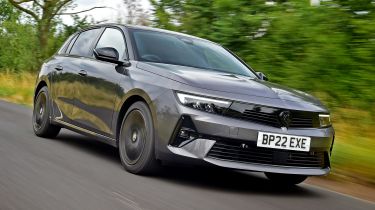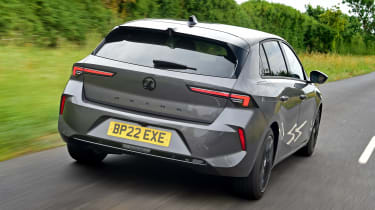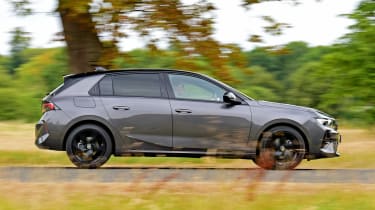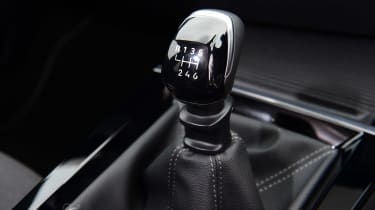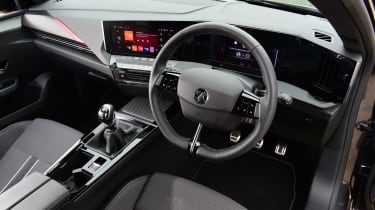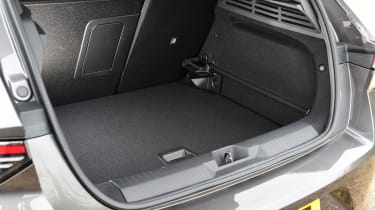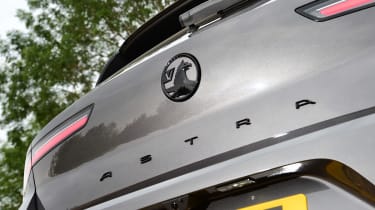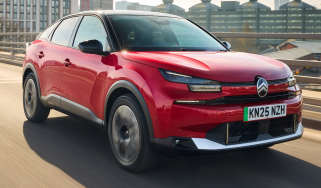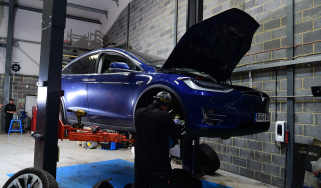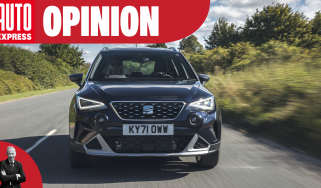Vauxhall Astra review
Stylish looks, impressive technology, and a wide variety of engines make the Vauxhall Astra a convincingly good family hatchback

The eight-generation Vauxhall Astra has been transformed into a smart-looking family hatchback that delivers good practicality, strong infotainment and a decent drive. Efficient petrol engines provide excellent fuel economy, while the plug-in hybrid and all-electric models add a breadth of ability that might persuade business users into the sharp-suited Astra.
There are a few quibbles; interior quality could be a little better in places, and space in the rear seats is a little tighter than we’d like, but as an overall package, the Vauxhall Astra is a strong contender in the family hatchback class.
About the Vauxhall Astra
The Vauxhall Astra has had a bit of an image problem over recent years with bland styling, dull engines, and little flair to excite buyers looking for a capable family hatchback. However, with the manufacturer being acquired by the PSA Group in 2017 and subsequently becoming part of the larger Stellantis family, Vauxhall has been reinvigorated and given a new lease of life.
We first saw the new Griffin style approach with the launch of the second-generation Mokka small SUV in 2020. Its sharp styling introduced the ‘Vizor’ design as the face of all future Vauxhall models. The refreshed Crossland and Grandland SUVs followed this, and now it’s the Astra’s turn to benefit from a thorough reworking.
Used - available now

2019 Vauxhall
Astra
40,493 milesManualPetrol1.6L
Cash £9,849
2025 Vauxhall
Astra
6,980 milesAutomaticPetrol1.2L
Cash £19,400
2019 Vauxhall
Astra
59,524 milesManualPetrol1.4L
Cash £7,648
2023 Vauxhall
Astra
11,857 milesManualPetrol1.2L
Cash £18,300The previous Astra didn’t offer the perceived quality of the Volkswagen Golf, nor the driving dynamics of the Ford Focus, while rivals such as the Mazda 3 and Honda Civic were striking alternatives that made Vauxhall’s hatch look lacklustre in comparison. Now in its eighth iteration, the Astra features a smart, modern appearance, impressive on-board technology and all-important electrified powertrains to boost its green credentials.
Despite the rising trend in family SUVs, there are plenty of other five-door hatchbacks currently on sale to challenge the Astra. The VW Group’s SEAT Leon, Skoda Octavia, and aforementioned Golf are all reliable, practical options, while the talented Korean pair of the Hyundai i30 and Kia Ceed are worthy of consideration. There’s also the Peugeot 308 and DS 4, which use the same EMP2 platform as the Astra. If you need to fit more junk in the trunk, the Astra is available in Sports Tourer estate form.
Buyers have a choice of petrol, plug-in hybrid, or electric power. The base 1.2-litre petrol engine produces either 109bhp or 128bhp, and comes with a six-speed manual gearbox as standard. An optional eight-speed automatic transmission is available for the more powerful version.
The 1.6-litre petrol plug-in hybrid powertrain produces 178bhp in the regular Astra, and 222bhp in the performance-oriented Astra GSe. This set-up allows the Astra to cover up to 43 miles without using a drop of petrol, and makes the PHEV a great company car choice.
If your circumstances can swing it, the all-electric Astra Electric is an even better choice for those looking to lower their Benefit-in-Kind (BIK) costs. It comes with a 154bhp electric motor with decent performance, and a 54kWh battery pack giving up to 258 miles of EV range.
Unlike the myriad choices offered with previous generations, the latest Astra comes with just three trim level options: Design (entry), GS (sporty) and Ultimate (luxury). The petrol Astra range starts from around £27,000, and is competitively priced with similar rivals. Prices for the plug-in hybrid models are a bit steep, starting at over £37,000, while our preferred GS-spec Astra Electric is priced at over £40,000.
Engines, performance and drive
The Astra sits on the third iteration of the Stellantis EMP2 platform, which also underpins the latest Peugeot 308 and new DS 4 family hatchbacks. Vauxhall has made numerous tweaks to ensure that it offers up its own driving character, focusing on increasing high-speed stability.
Adjustments to the steering, suspension, and anti-roll bars have given the Astra a sportier feel than its French stablemate. However, it doesn’t quite reach the dynamic ability of a Ford Focus.
Top-spec Ultimate and all-electric models come with 18-inch wheels as standard, but you’ll notice that the Astra is firm-riding even when equipped with the 17-inch alloys of the mid-range petrol GS version. It’s not uncomfortable, though, and adds to a sense of driving engagement, being adept through twisty B-roads, with little body lean and accurate steering. The electric motor and battery pack of the Astra Electric means it's around 400kg heavier than the lightest 1.2-litre petrol, so the Electric doesn’t handle quite as keenly, and will push wide in corners sooner than the petrol.
The base 1.2-litre turbocharged petrol engine is capable enough and doesn’t feel overly strained, although it becomes noisy under hard acceleration. A low drag coefficient of 0.269 helps the Astra cut smoothly through the air, while Vauxhall has introduced weight-saving ideas (the boot lid is made from thermoplastic) to boost performance and overall efficiency.
We like that every Astra comes with a special noise-reducing windscreen, so the car is quiet on the motorway. The 1.2-litre petrol engine is refined around town at low revs, and suspension noise over potholes and speed bumps isn’t intrusive. The most refined versions of Astra are the plug-in hybrid when driving in EV mode, or the Astra Electric, because there’s no engine noise to interrupt the peace.
The six-speed manual gearbox in the Astra is fine – not a weak point nor a highlight – and makes the car easy to drive around town. The optional eight-speed automatic gearbox is a little slow-witted and simply can’t compete with the keen responses of other hatchbacks with hybrid technology like the Honda Civic. The Astra Electric has a keener accelerator response, and because there are no gear changes, is a lot smoother when driving around town. Dialling in Sport mode provides a keener throttle response, but adds too much artificial weight to the steering, so we’d stick with the standard ‘Normal’ driving mode.
0-62mph acceleration and top speed
If you’re prioritising outright pace, then it's the plug-in hybrid Astras you'll want to go for. The regular Astra PHEV produces 178bhp and 360Nm of torque, enough to accelerate from 0-62mph in 7.7 seconds and hit a top speed of 140mph. However, the plug-in Astra GSe, with its 222bhp and 360Nm of torque, only needs 7.5 seconds to go from 0-62mph.
The 1.2-litre turbocharged petrol unit is available in 109bhp or 128bhp forms, with the former managing the same 0-62mph sprint in 10.5 seconds and the latter in a more rapid 9.7 seconds, whether it’s equipped with the six-speed manual or eight-speed automatic.
Despite the additional weight, the Astra Electric manages the same sprint in 9.2 seconds, and it feels nippy around town. Head further afield, and the instant EV punch trails off at motorway speeds, but it can still hold its own with the traffic flow.
MPG, CO2 and running costs
While the latest Astra will doubtless attract attention for its striking looks and impressive infotainment set-up, its fuel efficiency is also a major selling point. The petrol models all offer around 50-52mpg on the WLTP combined cycle, according to Vauxhall.
The Astra has proven itself to be a fairly economical family car during our own testing, too. After covering over 5,200 miles in our Astra 1.2 Turbo petrol long-term test car, we averaged 49.3mpg. However, hybrid rivals such as the Honda Civic and Toyota Corolla are even more frugal, and during some of our group testing, we’ve seen 50.3mpg from the Civic, and an even more impressive 54.2mpg from a 1.8-litre Corolla.
The petrol Astra’s CO2 emissions range from 123g/km to 132g/km, so business users will be looking at Benefit-in-Kind (BIK) rates of 29 to 31 per cent – not the most competitive figures in a growing age of electrification where the Corolla and Civic are in bands 25 and 26, respectively.
Fortunately, Vauxhall has introduced a plug-in hybrid model which is able to travel up to 43 miles on electric power alone. With CO2 emissions of 23-24g/km, the PHEV has a much more attractive 8 per cent BIK rating for company car drivers. Recharging its 12.4kWh (10.4kWh useable) battery using a 7kW wallbox will take around two hours.
If that’s still not good enough, then there's an all-electric version of the Astra, simply called the Astra Electric. It’ll cover up to 258 miles on a single charge and sits in the two per cent BIK band, at least until 2025. If you can find a rapid charger capable of supplying 100kWh of charging speed, you can charge from 20 to 80 per cent in less than half an hour. Refilling a flat battery at home using a 7kW wallbox will take eight hours.
Insurance
Insurance premiums for the Astra won’t be particularly cheap as even the entry-level 109bhp Design model sits in group 16 (out of 50). In comparison, the least powerful 123bhp Ford Focus in Titanium trim is one insurance group lower, while the least expensive Kia Ceed is in group 14.
Moving through the Astra line-up, both the 178bhp plug-in hybrid and Astra Electric models are in group 26, while the most expensive version to insure will be the performance-oriented GSe as it sits in group 31. That’s the same as the much faster and more desirable 316bhp VW Golf R.
Depreciation
According to our expert data, the eighth-generation Astra should prove to be a relatively strong performer on the used market. After a typical three-year/36,000-mile ownership period, it’ll retain around 46-50 per cent of its original list price, with the entry-level Design Astra Electric and GSe plug-in hybrid offering the best residual values across the range.
That’s on a par with its closest rivals. However, the Corolla, in either Excel or GR Sport form, will be worth almost 57 per cent of its value after the same time and mileage period.
To get an accurate valuation on a specific model check out our free car valuation tool...
Interior, design and technology
Vauxhall has done a great job moving the Astra more upmarket, as the previous model suffered from a dowdy and anonymous image that left it struggling well behind the class leaders. It’s now a modern, striking-looking family hatchback with strong lines that work well with the manufacturer’s Vizor front-end design.
The cabin includes plusher materials than before, with soft-touch plastics, and even some Alcantara inserts on the door cards of Ultimate trim models. There are still some cheaper plastics in view on the centre console and lower door cards, which is disappointing.
The trim structure is made of three regular trims – Design, GS and Ultimate – plus the standalone GSe model as the high-performance choice. Entry-level Design is well equipped, but there’s no disguising that the Astra simply looks better in either GS or Ultimate trim, with bigger 17 or 18-inch alloys, a sportier front and rear bumper design and black exterior trim replacing the chrome-effect accents found on the lower-spec model.
The mid-range GS trim is our pick of the range because, as well as the larger rims, it also gets 360-degree parking cameras, adaptive cruise control, keyless entry and an upgraded infotainment system. Adaptive LED headlights, a punchier sound system, head-up display, a panoramic sunroof and wireless smartphone charging are added to the Ultimate trim, but this sends the Astra's price tag to over £35,000 (and beyond £40,000 in plug-in hybrid and electric forms).
Sat-nav, stereo and infotainment
All Astras feature Vauxhall’s Pure Panel infotainment set-up as standard, but GS and Ultimate spec models feature an upgraded Pure Panel Pro system. Both consist of two 10-inch screens, one covering media functions and the other a digital instrument display providing information for the driver. Wireless Android Auto and Apple CarPlay are both included, along with a natural voice recognition system that we found to be both intuitive and accurate. However, loading times are a little slow, with some noticeable lag after selecting functions.
The dual-screen set-up looks great, and the Astra’s graphics look sharp. The reversing camera has great definition, too. We also like that Vauxhall has stuck with physical shortcut buttons and climate controls that are easier to use when on the move than touch-sensitive sliders, which have been a real bugbear of the VW Golf.
Practicality, comfort and boot space
It’s important for a family hatchback to be able to take care of the little things that help to make day-to-day life easier and more comfortable on the move. The Vauxhall Astra is good in this area with plenty of storage options in the cabin and lots of useful standard kit.
There’s a big cubby located between the front seats, two trays with sliding covers and a fold-out section below the central air vent that could be used to store a phone or sunglasses.
Keyless start, front and rear parking sensors, automatic wipers and cruise control all come as part of the entry Design specification, while GS spec models and above feature a front centre armrest with cupholders, a heated steering wheel and heated front sport seats – the latter has additional adjustments which means it received certification from the AGR (The Campaign for Healthier Backs in Germany).
Size
The eighth-generation Astra has increased in length by a few millimetres over the previous model and now measures 4,374mm from front to back, which is virtually equal to the Ford Focus (4,378mm), but 90mm longer than a VW Golf. At 1,860mm across, the Astra is the widest of the three family hatchbacks, although it sits the lowest to the floor at 1,441mm in height (compared to 1,471mm and 1,491mm for the Focus and Golf, respectively).
Leg room, head room & passenger space
While room up front is good, passengers travelling in the rear seats will find things a little tighter; head room is fine, but more leg room would be welcome. Those likely to put tall teens or adults in the back regularly should look at a Skoda Octavia instead.
There's plenty of room for passenger's feet under the front seats, though, and the central hump in the floor is much lower in the Vauxhall than in the Golf.
Two Isofix points are provided on the outer rear seating positions.
Boot
The Astra hatchback has a 422-litre boot, which easily outshines the 375 litres offered in a Focus, as well as the 380-litre load space provided by the Golf. Fold the rear seats, and the hatchback's luggage capacity expands to 1,339 litres. Of course, if you need even more space, the Astra Sports Tourer estate boasts 597 litres of boot space, or 1,643 litres with the rear seats folded down.
However, those figures only apply to the petrol versions. The Astra Electric and plug-in hybrid models lose 70 litres of space in the hatchback, and over 80 litres in the estate.
Towing
The 1.2-litre petrol Astra with a manual transmission can tow a braked trailer that weighs up to 1,250kg, while those equipped with the automatic gearbox can haul up to 1,400kg if you get the £605 optional tow bar.
Plug-in hybrid models can cope with a little more weight and are rated to tow up to 1450kg.
Those are all competitive numbers, but if you need even more capacity, you’ll need either an Octavia or Golf in 2.0 TDI 150 DSG auto form, because both can lug around a 1600kg trailer or caravan.
Reliability and safety
Vauxhall has equipped all Astra models with its PureSense suite of active safety kit, with every model getting lane departure warning with lane-keep assist, speed sign recognition, a driver drowsiness alert and automatic emergency braking (AEB). Adaptive cruise control comes with mid-range GS trim along with a more advanced collision alert system that works at higher speeds, while top-of-the-range Ultimate and GSe add blind spot monitoring and a lane position assist feature.
Unfortunately, the Astra stopped short of getting a five-star Euro NCAP score like its rivals, the Honda Civic, Renault Megane E-Tech, and VW Golf. The safety experts awarded the Astra (and the Peugeot 308 upon which the Astra is based) four stars out of five, criticising the lack of a central airbag to protect front seat occupants in a side-on collision, and the emergency braking system for its poor response in recognising pedestrians.
While the latest Astra didn’t feature in the most recent 2023 Driver Power owner satisfaction survey, the Vauxhall brand came in 24th out of 32 manufacturers in rankings. That puts it above fellow family car manufacturers VW, Ford, and Renault, but behind SEAT, Skoda, Honda, Hyundai, Toyota, Peugeot, Mazda, and Kia.
Warranty
All Vauxhall cars are covered by a three-year/60,000-mile warranty, which matches the coverage you get with a Volkswagen Golf or Ford Focus, but lags behind the seven-year warranty offered by Kia, or the ten-year warranty package provided by Toyota.
Plug-in hybrid and Astra Electric owners have a separate eight-year or 100,000-mile policy for the battery pack. If the battery’s usable capacity drops below 70% during that time, Vauxhall will replace it for free.
Servicing
If you own a petrol-powered Astra then Vauxhall recommends that you should book it in for a service every 12,500 miles or annually, while plug-in hybrid models are every 20,000 miles or annually, whichever comes first.
The Astra Electric needs an initial service after one year or 8,000 miles, whichever comes soonest, then it’ll need to be serviced every two years or 16,000 miles from that point onwards.
Vauxhall offers a range of servicing packages; Vauxhall Care is the most comprehensive, offering three years of servicing, two years of roadside assistance and a free MoT when your car needs it. Standalone fixed-price services are also available, plus a 12-month warranty on any work carried out.
Frequently Asked Questions
Vauxhall Astra GSe long-term test
Products editor Kim Adams lived with a plug-in hybrid Vauxhall Astra GSe as part of our long-term fleet. While it’s far from a full-fat hot hatch, the GSe does boast a decent 222bhp and Kim was impressed with how quick the car felt when driven hard.
However, life with the Astra GSe wasn’t without its disappointments. Keyless entry with a mind of its own and some overly intrusive driver assistance systems were just two of the reasons that this hatchback regularly put Kim’s patience to the test. A number of additional electrical gremlins only managed to rub salt in these wounds, too. You can read the full long-term test here…
